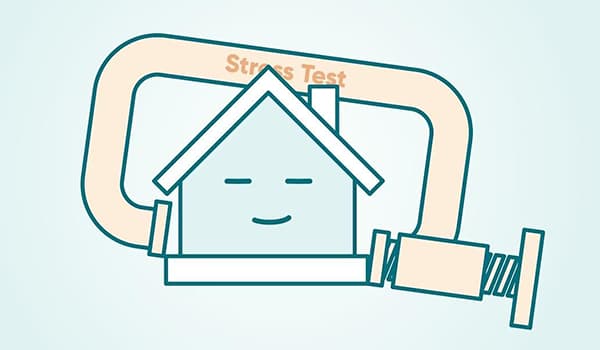Should the Stress Test Be Required for Mortgage Renewal?

Should the stress test be required for renewal? Here’s the short answer: if you stay with your current lender, no; if you’re switching to a new lender, yes.
For the long, comprehensive answer (when it’s required, current stress test rules in Canada, pros & cons, and how it affects you as a buyer), scroll through the next parts.
What Is the Mortgage Stress Test?
The mortgage stress test is a lender check that ensures borrowers can afford mortgage payments even if interest rates rise. The qualifying interest rate for the stress test is either 5.25% or the offered rate plus 2%, whichever is higher.
- The Federal Government introduced this test, which came into effect on January 1, 2018 (after rapid house-price growth), to protect both buyers and the housing market.
- It’s meant to keep buyers from taking on more debt than they can afford. It’s part of the standard mortgage application process; if the borrower passes the test, they’ll get approval.
When Is the Stress Test Required?
This test is commonly called the “mortgage renewal stress test”, as lenders mostly apply it to new mortgage originations and refinancing events. These are the main situations where the stress test applies:
- New home purchases (standard application).
- Most refinances that increase debt or change loan terms.
- Mortgage portability with changed terms (typically).
Note: Stress test exemptions and specifics depend on insured vs. uninsured status and regulatory updates. See the next part for more info.
Stress Test and Mortgage Renewals: The Current Rules
Should the stress test be required for renewal? Yes. Renewals with the same lender and no changes usually don’t trigger a new test, but switching lenders can.
However, as of OSFI’s Nov 21, 2024 guidance, a straight switch to a new lender —where the outstanding balance and mortgage amortization stay the same— is also exempt from the minimum qualifying rate (MQR) for uninsured mortgages; make sure to confirm with the lender.
So, here's a recap of current stress test rules in Canada:
- Same-lender renewal doesn’t need re-qualification in most cases.
- Straight switch to a new lender with the same balance + same mortgage amortization = OSFI exemption for uninsured mortgages.
- Any renewal that increases principal or changes the amortization usually requires a stress test.
Pros and Cons of Requiring a Stress Test at Renewal
Mortgage stress test at renewal protects borrowers against market competition and future rate shocks. At the same time, it can lock borrowers in and reduce switching.
- Benefits: It ensures households can handle higher rates; eases default risk; stabilizes the housing market and prevents spikes in prices.
- Drawbacks: Limits competition and rate shopping at renewal; creates “lock-in” that can keep borrowers on higher rates; may restrict borrowing power and make first-time buyers wait a bit longer.
How the Stress Test Affects Homeowners
The stress test determines how much you qualify for, and influences whether you can switch lenders at renewal. Here’s what you need to consider about this test:
- It limits your borrowing capacity and can reduce options when rates are rising.
- If you plan to take cash-out, increase principal, or extend term, you’ll usually face it for re-qualification.
- If you used a borrowed down payment, you should check insurer/lender rules, because it can affect insured status and renewal eligibility, too.
- It can make switching lenders intriguing (in case of stress test exemption); verify lender policies and fees.
FAQ
What is the purpose of the mortgage stress test?
Should the stress test be required for renewal? Yes. But why? To ensure borrowers can afford payments if rates rise and manage systemic risks of over-borrowing.
Do I need to pass the stress test when renewing with my current lender?
Same-lender renewals without changes don’t require re-qualification. But confirm your bank’s process just in case.
Does the stress test apply if I switch lenders?
It can, but OSFI exempts straight switches of uninsured mortgages where balance and amortization are unchanged (effective November 21, 2024).
How can I prepare for the stress test?
Prepare your income docs, lower high-interest debts, check your credit, and review mortgage renewal tips like locking paperwork early, comparing contract terms, etc.
Final Thoughts: Should the Stress Test Apply to Renewals?
Both sides of the stress test debate matter to homebuyers, and balance is the best approach: keeping safety measures for financial protection while allowing some flexibility. So, focus on payment comfort, potential rate changes, and whether your amortization and renewal plans align with your long-term goals.
- In this post:
- What Is the Mortgage Stress Test?
- When Is the Stress Test Required?
- Stress Test and Mortgage Renewals: The Current Rules
- Pros and Cons of Requiring a Stress Test at Renewal
- How the Stress Test Affects Homeowners
- FAQ
- Final Thoughts: Should the Stress Test Apply to Renewals?



